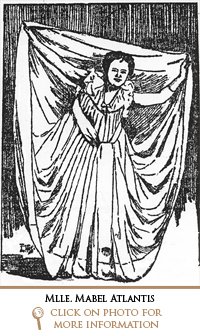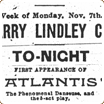 | |||||||||
| |||||||||
Mabel Atlantis appeared with the Harry Lindley Comedy Company, a repertory company that toured the Northwest during the last three years of the nineteenth century. Lindley's own story is well documented and he wrote an autobiography, Merely Players, published in Toronto circa 1890. We know, for instance, that as a young man he trained with provincial repertory companies in England and by the end of the century was an experienced actor-manager. Atlantis, however, is more elusive. What we do know is that she provided, to great critical acclaim, specialty dances between acts or at the close of the evening during the company's two runs at the City Hall Theatre. The theatre, also known as the City Music Hall, was located on the second floor of the Market Hall on the northwest corner of Westminster Avenue (now Main Street) at Pender. The Market Hall was built in 1889, and its ground floor was a public market for poultry and farm produce, with a lane outside for horses, cattle and swine. The second floor was intended for political rallies and concerts. In 1894, when the Imperial Opera House became a military drill hall, stock companies used the Market Hall, which in 1898 became the new City Hall after the city's aldermen moved into the building. It was here that the Lindley Company had such success with their repertory of melodramas and comedies. Their first six-week run opened on Friday, October 21, 1898. “Mlle Atlantis, the famous serpentine and butterfly dancer,” was to have opened with the company on Thursday, November 10 but something went wrong with the electrical connections, and the Province informs us on Friday that “her part of the entertainment had to be declared off.” However, a special wire was arranged on Saturday night for her electrical effects. On November 15, Atlantis appeared in a new specialty, An Inspiration Dance, for which “(h)er costume was very pretty and her manoeuvres unique and artistic.” On November 18: “Mdlle [sic] Atlantis introduced a new specialty in the shape of a butterfly dance, which from an artistic point of view probably excels anything she has yet attempted in Vancouver. Her costume, which was gorgeous in the extreme, seemed more susceptible to the beautiful shades of light which were thrown upon it, while her tripping to the music of the orchestra was exquisitely graceful.” Atlantis' act continued to astonish as she ran through her specialty repertoire. Part of her popularity was no doubt the suspense she inspired in an audience, who never knew what she was going to do next. At one performance she appeared “swinging and juggling Indian clubs, balls, etc., while balancing on a revolving globe.” The faithful newspaperman obligingly contributes to the suspense: “She will repeat it tonight with a few changes” (Nov. 23, 1898). The Lindley Company closed their popular City Hall appearance with a four-hour continuous run on November 28 before leaving to play a week in Chilliwack, and then heading to the Interior. When the company returned in March the following year, they opened with On to the Klondike, written by Lindley himself, and set in the Klondike gold rush of the 1890s. Atlantis, who closed the opening performance, “held her spectators in suspense for a couple of minutes by controlling the globe up and down a narrow and slanting plank, a difficult and risky act” (Province, Mar. 3, 1899). At the time of the Lindley Company's return engagement, Gussie Lamore was doing a mirror dance with Nellie Perry, “a remarkably pretty turn,” over at the Savoy (Province, Mar. 15, 1899). The Savoy Music Hall had opened on Cordova Street near Abbott in 1898, with a saloon and a restaurant on the ground floor. It was demolished in 1940 to make room for the Woodward's parkade. Lamore, the “Klondike Nugget,” was another darling of the Province, which reported on March 18 that “for two joyous weeks she has scintillated on the stage at the Savoy....” Soprano Lamore (or La More), who was notorious for having run off with gold belonging to Swiftwater Bill, is quoted as saying, “I often feel embarrassed when I have to go on the stage in short skirts but of course one has to overcome that squeamishness.” Whether the main event was a melodrama or a comedy, specialty acts were essential for drawing a crowd. Other inducements from the Lindley Company were a children's gift matinee and, at another performance, the distribution of 12 alarm clocks and an 8-day clock. But the Province reporter draws attention on March 22, 1899 to what was perhaps the best drawing card: “The specialties will be especially attractive. Electrical connections with the building have been made and Mdlle [sic] Atlantis will introduce for the first time in Vancouver her famous Cleopatra fire dance.” Later, on March 28, the writer enthuses: “This was a most realistic performance - so realistic in fact that the extravagantly costumed dancer seemed to be hopelessly enveloped in red, fiery flames. There was only one fault to be found with it. It was cut a little too short.” The Province reported on March 29 that during one performance a small boy was heard shouting, “Look out, you'll burn your legs!” (next page)
©2006, Dance Collection Danse | ||||
| ||||



